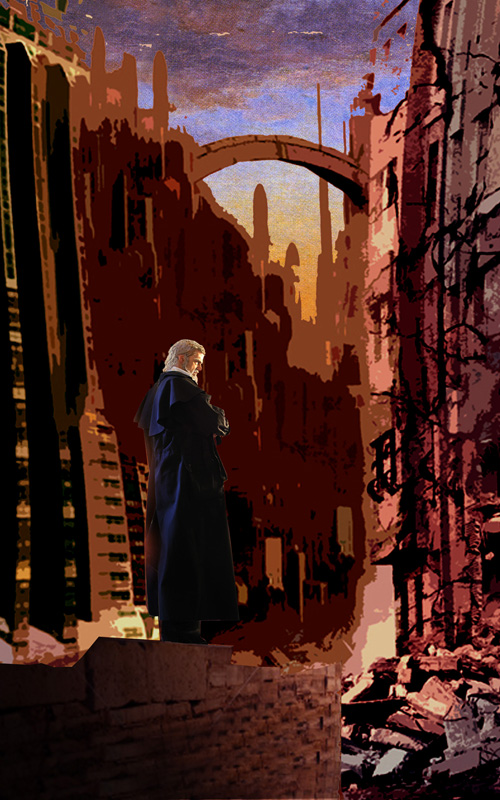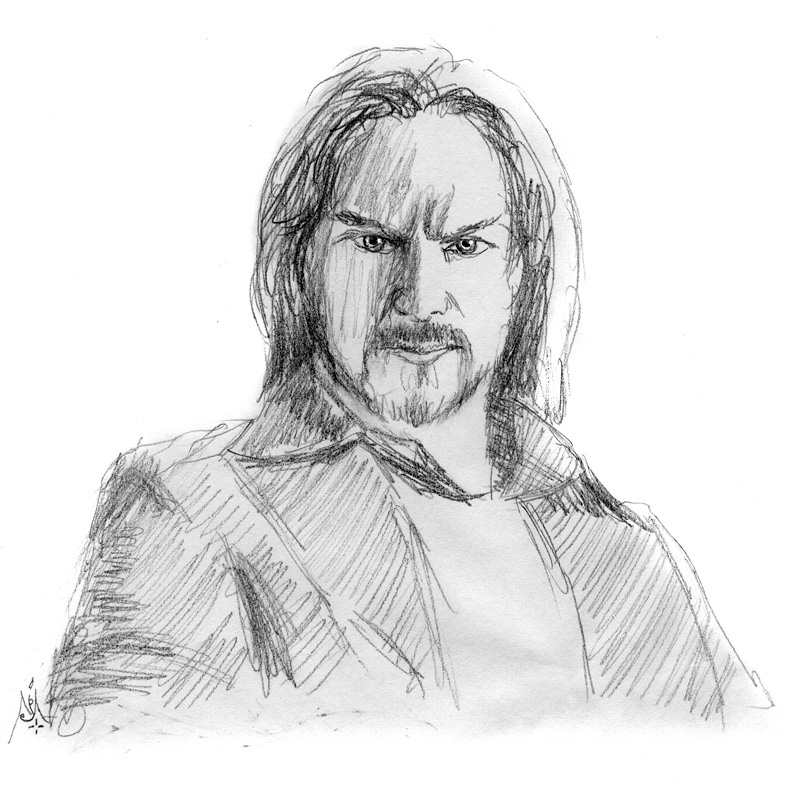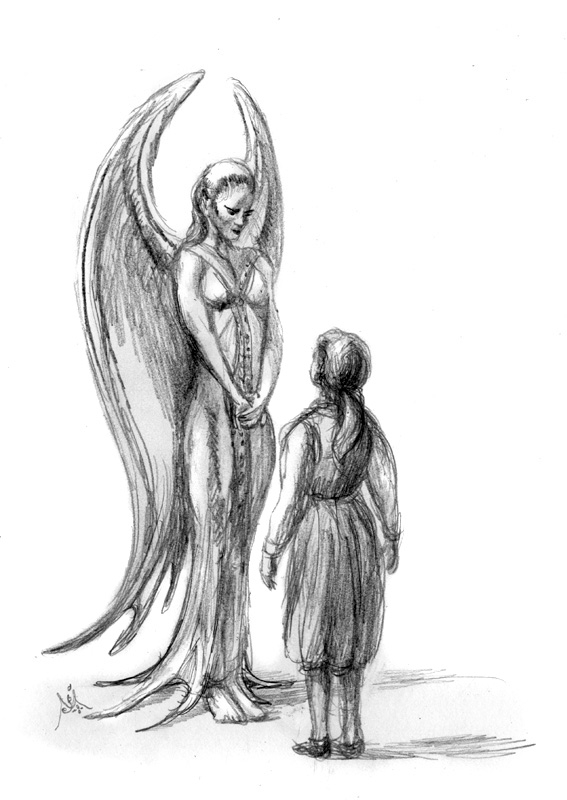In the Company of Angels, Episode 9.2 – The Renderer (cont.)
“Yes, I’m afraid I do,” said Azarias, his brow furrowing. “What is it about the Jonsson family? Well, we can’t overly concern ourselves with that issue at present. Pray continue.”
Luke picked up the tale, including Sam’s loss of one of the crystals and its recovery by Jill. Both Azarias and Father Hildebrandt were alarmed to hear that it had been out of Sam’s possession for as long as it had, and they were not surprised to hear that the Amenta had gathered to try to take the gem.
“Sam calls them ‘spooks’, or just ‘howlers’ of course, but we all know that they are the vanguard of a much greater Darkness,” said Azarias, “That was a close call! But thereafter, you invited Miss Jonsson to visit you at the Gallery. Why in the world would you do that without consulting me?”
“Because Sam knows her,” said Luke, “and he was sure she had seen too much to dismiss without a great deal of additional explanation. He also, I believe, has good instincts for people, despite not being an Empath himself. In addition, Polydora believed that Sam would have great difficulty dissembling over the events at Jill’s home, since they are such good friends. I took a chance; and it paid off, as you’ll soon hear.”
Luke continued his tale, explaining how Jill had come to the Gallery and had been instantly identified by Polly not only as an Empath, but as an extraordinarily gifted one.
“Polly claimed she had never encountered anyone other than you, Azarias, who had the ability to see as far or as clearly.”
Azarias and Father Hildebrandt looked at each other, and Luke suspected that a quiet telepathic exchange had taken place. But it only lasted a moment.
“Please, Luke, do continue,” said Father Hildebrandt, turning back toward him.
Luke described the trip to Orbaratus, Polly’s recognition that things were amiss, the trip to the Plaza of the Masters, and the discovery that one of the three guarding stones was missing. At this both Azarias and Father Hildebrandt became alarmed.
“It is, then, as we feared,” said Azarias. “The events here have been a diversion; the real drama is about to play out on Orbaratus, and we will have to do everything in our power to get that stone back into place if we are to avoid catastrophe.”
“Then you know about the stones?” asked Luke.
“Know about them? Yes indeed! But tell us what happened once you had discovered that a gem was missing.”
Luke mentioned the earthquake, the raven, and his decision to allow Sam and Jill to try to follow the bird and retrieve the stone.
“I understood the risks, but we could not leave Jill alone with a crystal on her; that would have put her in danger, since she has not yet been placed under protection.”
Azarias looked up at Father Hildebrandt. “We’ll need to remedy that as soon as possible.”
“Agreed,” said the Abbot.
Luke continued. “I believe that Sam and Jill, working together as a team, should be as capable as anyone of finding the bird and the guarding stone. I also felt urgently that I needed to warn both of you and seek advice. For I could only deduce the gem’s significance; I could not be certain of it. The situation called for us all to split up in order to save time.”
“But what of Polydora? Did she accompany Sam and Jill, or did she return to the Gallery?” Azarias leaned forward with an anxious look on his face as he asked the question, as did Father Hildebrandt. Luke wasn’t sure why the issue was so important to them.
“She remained on Orbaratus,” he said.
Both of the older men appeared visibly relieved. “She should certainly be able to keep anything worse from happening on her homeworld, and much better so than anyone else under the circumstances,” said Azarias, “But she doesn’t really understand what may be coming, and we mustn’t leave her there alone for too long, particularly if the Masters are indeed showing signs of stirring.”
“So that is what is happening?” asked Luke, “The Masters — the ones behind the stone gate — are awakening because the guarding stone was removed? As I said, I deduced that something of the sort could possibly occur, once Polly had fully translated the verses above the door for us. They were certainly a warning, even though they were written onto the stone lintel thousands of years ago.”
Azarias smiled. “Indeed, you surmised correctly. And that is precisely why the verses were left over the gateway in the first place. Yet, the Masters should remain restrained as long as only one of the stones has been prised away. They may stir, and they may even be able to regain a small measure of wakefulness, but the gate will hold against them — at least for a while.”
“But there is still much that you do not know, Luke, and at this point, despite our need for haste in returning to Orbaratus…”
“So you will be coming with me?” interrupted Luke.
“Yes, yes, certainly! That is a necessity at this point, but for reasons I’ve yet to state. In the meantime, I think it time to acquaint you more fully with the early history of Orbaratus. In fact, that also is imperative, so that you know what it is we may be facing.
“What I am about to tell you,” Azarias said, rising from his chair and pacing before the Abbot’s desk, “is now known only to myself, Father Hildebrandt, and the Masters, although their perspective on these events would be, as you might imagine, considerably different from ours. Not even Polydora knows all of what you are about to hear.
“When we first explored Orbaratus and discovered Polydora there, it was clear that her world had been victimized by the Amenta. After Polly came back with us and began her work in The Gallery, I took the opportunity to make many trips to her world so that I could better understand what had happened there and to try to determine whether her world was truly as empty and abandoned as it first appeared to be.
“It was not.
“The Amenta had conquered the original peoples of Orbaratus, the ones we now know as the Masters. But in those earliest days, they called themselves simply the Ferrubene, or the ‘Blessed Ones’ in their own tongue. They were a brilliant people, skilled in crafts, the arts, and philosophy, and as their ultimate achievement, they brought into being a servant race of creatures that, at first, were simply clever automatons. But these were gifted with learning algorithms that ultimately, and in a manner beyond the wildest hopes of the Ferrubene craftsmen, resulted in their awakening into a fully sentient race. This, of course, was far beyond the Ferrubene’s own skill; it was a gift granted by One greater than themselves, and it was ultimately to a greater purpose of its own, as you shall see.
“But, the Ferrubene liberality in learning, and their untempered love of tolerance and diversity, led to their downfall. After the awakening of their servants, their educators and leaders allowed evil ideas to creep into their prosperous and peaceful world, and these ideas remained unchallenged. Prosperity ever breeds excessive complacency and misplaced tolerance toward evil, Luke, as you should always remember. Ah, there have been so many civilizations destroyed by their own successes! But, I digress….
“In the case of Orbaratus, the seemingly benign tolerance and the weakening of a societal moral compass — all made possible by wealth and abundance — extended even to the point of defending evil doctrines in their many guises. In such a setting, idleness also encouraged dangerous experimentation among the elites, and the Amenta, who are able to travel unfettered into any world that invites them in, found their opening and quickly exploited it.
“The Amenta, once they had come to Orbaratus, whispered into the ears of the rulers among the Ferrubene, promising ever greater riches and glory if they promoted what was in effect a new religion: one that would ultimately serve to destroy their world. The tenets of this religion are unimportant, but it cloaked its adherents in a mantle of victimhood and injustice that they used against the greater Ferrubene society itself. The religion was quietly taught to those with less education and skills: these were convinced that they were victims of societal injustice, and that the new faith would avenge all the wrongs they had suffered. Others were converted through promises of more power, or, as a last resort, by threats of violence to themselves or to their families.
“The worship of novelty had become so widespread at this time, by the urgings of the Amenta, that common sense was utterly abandoned, and anyone who challenged the teachings of the new religion was labeled a bigot and a hater of the coming ‘New Era’. Societal disruptions increased, and eventually these reached the stage that stopping them and prosecuting their instigators was impossible. Killings and riots in the name of the new religion became widespread. Whole cities were burned and looted, and the Ferrubene people turned against themselves in open civil war after civil war.
“In this setting, the Ferrubene’s servants strove against the teachings of the new religion, and even while the Ferrubene killed themselves off, the Ferrumari ever sought to save the lives of their creators. But they were largely unsuccessful, for the Ferrumari numbers were too few. In the end, most of the Ferrubene died, leaving behind only the worst and the most corrupted of their rulers. These the Amenta had preserved, knowing them to be their greatest servants.
“Now that there were so few of the Masters left, the Ferrumari captured and imprisoned them, fashioning for their onetime creators a place where they could be held harmless. But the prisons were incapable of holding the Masters, until, ultimately, when the opportunity was offered them, the Ferrumari put the last of that twisted master race into a state of biological suspension. This was done in the hopes that a day might come when they could be cured of their madness, for the Ferrumari were and are a very compassionate people.
“The gate to their resting place was sealed with three crystals whose power was both to sustain the Masters’ suspension and to keep the gate that sealed their prison strong and inviolate.
“Without the Masters to breed further strife, the Ferrumari themselves at first thrived, but they, too, many thousands of years later, also became victims of the Amenta. In the end, they, too, turned upon themselves, ultimately destroying all members of their own race save Polydora. She and the Masters who remained alive — although suspended behind and below their stone gateway — are now the only living inhabitants of Orbaratus. You, Luke, are already familiar with this latter history, as I recall.”
“Yes, I am,” said Luke, “and I related it to Jill and to Sam earlier today. But I was certainly unaware that the Amenta had claimed both of the planet’s sentient races, rather than just the latter one.”
The room was silent while they all considered Azarias’ words.
“But how on earth did you learn all of this?” asked Luke. “Polly lived for thousands of years on her planet, and she was unable to fully decipher anything other than fragments of the history you’ve just related.”
“Ah, yes, that is true,” said Azarias, “but Polly did not have the one tool she might have used to discover the full truth about her planet’s ancient history.”
“And what tool was that?”
“Why, the ability to framerun, of course. I was able to learn much, much more than she ever could in all her years on Orbaratus; but that was only possible because I was able to travel to her world through both space and time.”
“So are you saying you went back to Orbaratus during the earliest times of the Masters and directly witnessed much of what you have just related?”
“I not only witnessed it, but I did what I could to minimize the sufferings that I encountered there; at least, to the extent I was able.”
“What do you mean?”
“Simply this; that it was I who taught the Ferrumari how to contain the Masters. And it was I who placed the three guarding stones upon the gateway in the first place, sealing them within!”
[ To read Episode 10.1, click here…. ]





